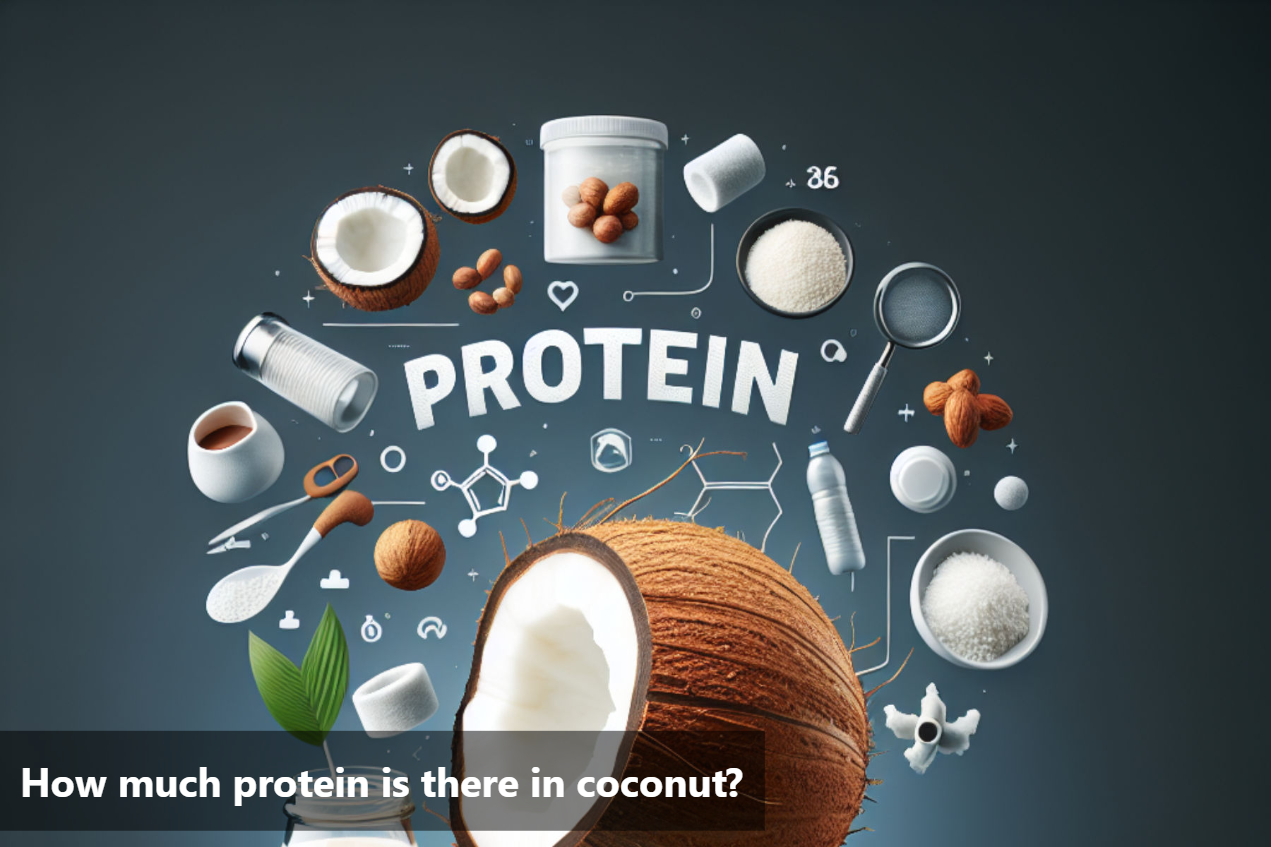
How much protein is there in coconut?
Coconut, a versatile tropical fruit known for its multitude of uses, also offers a unique nutritional profile that includes a considerable amount of protein. While often associated with its refreshing water and creamy flesh, coconut also contains a notable amount of protein, making it a valuable addition to a well-rounded diet.
In just one cup of shredded coconut, you can find a modest yet beneficial amount of protein. This protein content in coconut contributes to muscle maintenance, repair, and overall growth, essential for a healthy body. Additionally, coconut protein is a great option for individuals following plant-based or vegan diets, as it offers a natural and sustainable source of this essential macronutrient.
Furthermore, the protein in coconut is complemented by its other essential nutrients, such as healthy fats, vitamins, and minerals, which collectively support overall health and well-being. Incorporating coconut protein into your diet can be a flavorful and enjoyable way to boost your protein intake while reaping the benefits of its unique taste and texture.

Nutritional profile of coconut
Nutrients |
Amount |
|---|---|
Calories |
160 |
Fat |
15g |
Sodium |
9mg |
Carbohydrates |
6.8g |
Fiber |
4g |
Sugars |
2.8g |
Protein |
1.5g |
Potassium |
160mg |
Manganese |
0.68mg |
Selenium |
4.5mcg |
Comparing coconut protein to other sources
Coconut protein is often overshadowed by other more common sources of protein, such as meat, dairy, and plant-based proteins. However, it still deserves a closer look when it comes to its nutritional content.
When comparing the protein content in coconut to other sources, it's essential to note that while coconut is not as protein-rich as meat or dairy, it still offers a decent amount of protein per serving. For those following a plant-based diet or looking to diversify their protein sources, coconut can be a valuable addition.
Unlike meat and dairy, coconut protein is plant-based, making it a suitable option for vegetarians and vegans. It also provides essential amino acids required for overall health and well-being.
Incorporating coconut protein into your diet can help add variety and potentially reduce the environmental impact associated with animal-based proteins. It can be used in various forms, such as coconut milk, coconut flour, or shredded coconut, allowing for flexibility in meal preparation.
Ways to incorporate coconut protein into your diet
One simple way to include protein-rich coconut in your diet is by adding coconut flakes to your morning oatmeal or cereal for a crunchy twist and a nutritional boost.
Consider using coconut milk as a base for smoothies or shakes to add a creamy texture and a hint of coconut flavor while increasing your protein intake.
Another option is to use coconut flour in baking recipes such as muffins, pancakes, or bread to enhance the protein content and create a unique taste.
Experiment with incorporating coconut yogurt into your daily meals as a dairy-free alternative that offers a good amount of protein and probiotics for gut health.
Try making coconut protein balls by mixing coconut protein powder with nut butter, honey, and rolled oats for a delicious and protein-packed snack on the go.
Utilize coconut oil for cooking or baking to add a subtle coconut flavor to your dishes while reaping the benefits of its medium-chain fatty acids and potential antimicrobial properties.
Explore cooking savory dishes like curries or stir-fries using coconut cream to boost the protein content and create a rich and flavorful meal.
Don't forget to sprinkle shredded coconut over salads, soups, or stir-fries as a topping to add both texture and a dose of plant-based protein to your dish.

Exploring the Protein Content of Coconut
One key takeaway is that while coconut is not a primary source of protein compared to meat or dairy, it still offers a valuable plant-based protein option. Its unique composition makes it a great addition to vegetarian or vegan diets seeking alternative protein sources.
Moreover, by comparing coconut protein to other common sources like meat, dairy, and plant-based proteins, we highlighted the versatility and benefits of including coconut in various forms. From coconut milk to shredded coconut and coconut flour, there are diverse ways to benefit from its protein content.
Incorporating coconut protein into your diet can enhance nutritional intake and add a tropical twist to your meals. Whether used in smoothies, curries, or baked goods, coconut brings a delicious flavor along with its protein power.
In essence, embracing coconut protein diversifies your nutrient intake and contributes to a well-rounded, wholesome diet. Remember, balance is key, and including coconut protein can be a delightful and beneficial choice for your overall health and wellness.
FAQs
-
Is coconut a good source of protein?
No, coconut is not considered a high-protein food. It is more valued for its healthy fats and other nutrients.
-
Are there any other plant-based sources of protein that are better than coconut?
Yes, there are many plant-based sources of protein that offer more protein content than coconut, such as legumes, nuts, seeds, and tofu.
-
Can coconut be included in a high-protein diet?
While coconut can be enjoyed as part of a balanced diet, it may not be the best choice for those looking to increase their protein intake significantly.
This Blog post is an initiative by Lo! Foods, to provide accurate and Nutritionist / Doctor approved information related to Health. Lo! Foods is India's leading brand for Everyday Functional Foods. Foods designed for specific Health conditions or Needs. Lo! Foods also runs India's largest range of Low Carb Healthy Cloud Kitchens, under the brand names of Lo!, ProteinChef, ATH (All Things Healthy) and DiabeSmart.















Leave a comment
Your email address will not be published.